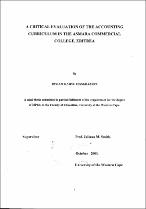| dc.contributor.advisor | Smith., Juliana M. | |
| dc.contributor.author | Fessehazion, Biniam Kahsu | |
| dc.date.accessioned | 2020-11-11T13:41:18Z | |
| dc.date.available | 2020-11-11T13:41:18Z | |
| dc.date.issued | 2002 | |
| dc.identifier.uri | http://hdl.handle.net/11394/7451 | |
| dc.description | Magister Philosophiae - MPhil | en_US |
| dc.description.abstract | This study deals with the evaluation research conducted to evaluate the Accounting curriculum of Asmara Commercial College (ACC), Eritrea. The purpose of the Accounting programme in this college is to train middle level skilled manpower to satisfy the dire shortages of Accounting personnel in the country. Accounting education in Eritrea seems to lag behind the rest of the world, particularly in curriculum administration and development aspects of the discipline. The target group of the above programme was directed to the 11th grade candidates who have passed the matriculation exam. The primary goal of this training was to achieve qualified students and help them to prepare for the world of work at the end of the programme. A second goal was to assist them in their professional development as future accountants. The study therefore evaluated how successfully the Accounting curriculum helped the students to develop themselves academically and professionally. It was also aimed at providing some suggestions and recommendations to the curriculum developers and teachers of the college in particular and other interested parties to assist them in identifying different aspects of the object of evaluation questions to be addressed. The researcher used both a literature review and empirical data to achieve the desired aim. Based on the literature, the Accounting education concepts, the concepts of change and evaluation as well as the role of evaluation in relation to the Accounting curriculum had been reviewed in order to support the study with its theoretical background. In the empirical part of the study, it investigated the perceptions of the respondents concerning the current Accounting practice at ACC and its relationship with the world of work. The necessary empirical data were mainly collected by 1) interviews and 2)-document analysis. The respondents were seven: 1) the director of ACC, 2) two Accounting instructors from ACC, 3) two employers, and 4) two graduates students. A normal flow of text had been used to analyze each response given to the interview items by respondents and observation of documents. | en_US |
| dc.language.iso | en | en_US |
| dc.publisher | University of Western Cape | en_US |
| dc.subject | Asmara Commercial College (ACC) | en_US |
| dc.subject | Eritrea | en_US |
| dc.subject | Curriculum | en_US |
| dc.subject | Accounting education concepts | en_US |
| dc.subject | Syllabus | en_US |
| dc.title | A critical evaluation of the accounting curriculum in the Asmara commercial college, Eritrea | en_US |
| dc.rights.holder | University of Western Cape | en_US |

